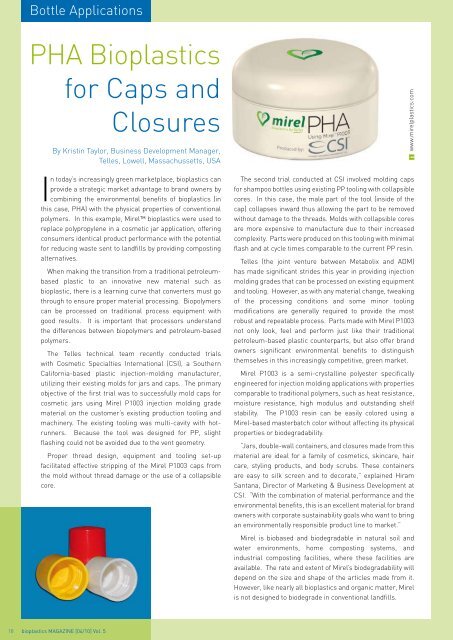04 | 2010
Create successful ePaper yourself
Turn your PDF publications into a flip-book with our unique Google optimized e-Paper software.
Bottle Applications<br />
PHA Bioplastics<br />
for Caps and<br />
Closures<br />
By Kristin Taylor, Business Development Manager,<br />
Telles, Lowell, Massachussetts, USA<br />
In today’s increasingly green marketplace, bioplastics can<br />
provide a strategic market advantage to brand owners by<br />
combining the environmental benefits of bioplastics (in<br />
this case, PHA) with the physical properties of conventional<br />
polymers. In this example, Mirel bioplastics were used to<br />
replace polypropylene in a cosmetic jar application, offering<br />
consumers identical product performance with the potential<br />
for reducing waste sent to landfills by providing composting<br />
alternatives.<br />
When making the transition from a traditional petroleumbased<br />
plastic to an innovative new material such as<br />
bioplastic, there is a learning curve that converters must go<br />
through to ensure proper material processing. Biopolymers<br />
can be processed on traditional process equipment with<br />
good results. It is important that processors understand<br />
the differences between biopolymers and petroleum-based<br />
polymers.<br />
The Telles technical team recently conducted trials<br />
with Cosmetic Specialties International (CSI), a Southern<br />
California-based plastic injection-molding manufacturer,<br />
utilizing their existing molds for jars and caps. The primary<br />
objective of the first trial was to successfully mold caps for<br />
cosmetic jars using Mirel P1003 injection molding grade<br />
material on the customer’s existing production tooling and<br />
machinery. The existing tooling was multi-cavity with hotrunners.<br />
Because the tool was designed for PP, slight<br />
flashing could not be avoided due to the vent geometry.<br />
Proper thread design, equipment and tooling set-up<br />
facilitated effective stripping of the Mirel P1003 caps from<br />
the mold without thread damage or the use of a collapsible<br />
core.<br />
The second trial conducted at CSI involved molding caps<br />
for shampoo bottles using existing PP tooling with collapsible<br />
cores. In this case, the male part of the tool (inside of the<br />
cap) collapses inward thus allowing the part to be removed<br />
without damage to the threads. Molds with collapsible cores<br />
are more expensive to manufacture due to their increased<br />
complexity. Parts were produced on this tooling with minimal<br />
flash and at cycle times comparable to the current PP resin.<br />
Telles (the joint venture between Metabolix and ADM)<br />
has made significant strides this year in providing injection<br />
molding grades that can be processed on existing equipment<br />
and tooling. However, as with any material change, tweaking<br />
of the processing conditions and some minor tooling<br />
modifications are generally required to provide the most<br />
robust and repeatable process. Parts made with Mirel P1003<br />
not only look, feel and perform just like their traditional<br />
petroleum-based plastic counterparts, but also offer brand<br />
owners significant environmental benefits to distinguish<br />
themselves in this increasingly competitive, green market.<br />
Mirel P1003 is a semi-crystalline polyester specifically<br />
engineered for injection molding applications with properties<br />
comparable to traditional polymers, such as heat resistance,<br />
moisture resistance, high modulus and outstanding shelf<br />
stability. The P1003 resin can be easily colored using a<br />
Mirel-based masterbatch color without affecting its physical<br />
properties or biodegradability.<br />
“Jars, double-wall containers, and closures made from this<br />
material are ideal for a family of cosmetics, skincare, hair<br />
care, styling products, and body scrubs. These containers<br />
are easy to silk screen and to decorate,” explained Hiram<br />
Santana, Director of Marketing & Business Development at<br />
CSI. “With the combination of material performance and the<br />
environmental benefits, this is an excellent material for brand<br />
owners with corporate sustainability goals who want to bring<br />
an environmentally responsible product line to market.”<br />
Mirel is biobased and biodegradable in natural soil and<br />
water environments, home composting systems, and<br />
industrial composting facilities, where these facilities are<br />
available. The rate and extent of Mirel’s biodegradability will<br />
depend on the size and shape of the articles made from it.<br />
However, like nearly all bioplastics and organic matter, Mirel<br />
is not designed to biodegrade in conventional landfills.<br />
www.mirelplastics.com<br />
18 bioplastics MAGAZINE [<strong>04</strong>/10] Vol. 5


















